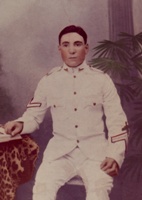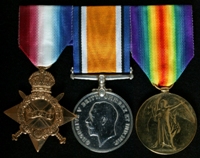
Photograph of Gordon in Tameside Local Studies and Archives Centre. Reference: Acc3700

(L to R) 1914-15 Star; British War Medal; Allied Victory Medal
Gordon was born on the 23rd October 1891 in Charlton, then in Kent but now part of the London Borough of Greenwich. His father was called Horace Edmund and his mother was Letitia. He had an older brother named Duncan Sage and 2 younger siblings: Hugh Leslie and Letitia Emily.
When Gordon was born his family lived at 396 Woolwich Road in Charlton and Horace worked as a store keeper. By 1901 he was employed at an electrical works and the family were living at 16 Milton Road in West Ham, north east London.
We don't know what civilian job Gordon had, but on the 30th December 1909 he began his military career by joining the 6th Battalion of the Rifle Brigade. This was a unit of the Special Reserve based in Winchester, Hampshire. A Special Reservist was a man who had not previously served in the Regular Army. They kept their civilian career, but trained to be a soldier for a short period every year. Unlike the Territorial Force, which was intended to serve as complete units within the UK or Empire, Special Reservists could be sent to join Army units anywhere as individuals or in small groups. Gordon was given the service number 9692 and assigned to F Company.
It seems Gordon took to military life because on the 15th April 1910 he enlisted in the Regular Army. He joined the Manchester Regiment at Woolwich, London and was given the service number 1770.
In January 1913 Gordon was serving with A Company of the 2nd Battalion, based in The Curragh Camp in Ireland. He was still with them that July when he obtained the 3rd Class Army Certificate of Education.
By December Gordon had been appointed a Lance Corporal. On the 12th he travelled to Southampton and boarded the SS Roehilla. He had been transferred to the 1st Battalion of the Manchester Regiment, based in Jullundur, now Jalandhar in the Indian Punjab.
The First World War broke out in August 1914 and the 1st Battalion quickly assembled and organised itself to go to Europe and join in the fighting. It left India on the 29th August for France, but we don't know whether Gordon went with them.
The 1st Battalion arrived in France during September, but Gordon did not enter this country until the 27th April 1915. We don't know why this happened or what he was doing during this time. During November the 1st Battalion and other units that had travelled from India were withdrawn from France and sent to Mesopotamia, today called Iraq. They arrived there on the 8th January 1916.
At some point during 1916 Gordon was transferred to the Machine Gun Corps (MGC). This was a new unit that was formed to operate the Vickers Machine Gun. This suggests that Gordon was a member of the 1st Battalion's Machine Gun Section and was transferred along with his comrades. We don't know which Machine Gun Company he was transferred to, although the 132nd Company MGC supported the 1st Battalion. Gordon's new service number was 61849.
Gordon served in Mesopotamia, Egypt and Palestine throughout the rest of the war. He was wounded once, although we don't know how serious it was. The war ended in November 1918 and Gordon was discharged from the Army at Alexandra Palace in London on the 21st April 1919. He was 'surplus to military requirements having suffered impairment since entry into the service'.
When he was discharged Gordon was 5 feet 3 1/4 inches tall. He had a 'fresh' complexion, hazel eyes and brown hair. He had a scar on his upper lip.
As a civilian Gordon went to live at 54 St Audrey's Road in Barking, Essex. He married Emily Marie Rowles between October and December 1923 in the Romford area, and they had one son, Derek, between April and June 1926. We don't know anything about his civilian employment.
When the Second World War broke out in September 1939 Gordon and Emily were living at 86 Cranley Drive in Ilford, Essex. Gordon served as an instructor in the Army Cadet Force. He served as a small arms instructor and rose to the rank of Regimental Sergeant Major in the 2nd Cadet Battalion of the Essex Regiment.
On the 20th February 1945 a German V2 rocket was fired at London, one of around 1400 launched at the city. This one destroyed 86 Cranley Drive and killed Marie. She was 44 years old.
Gordon married again to Blanche Croker between April and June 1946. At some point he moved to the Bakewell area of Derbyshire, and died there in May 1984 at the age of 92. Gordon's medals were donated to the Museum of the Manchester Regiment in November 2000.




